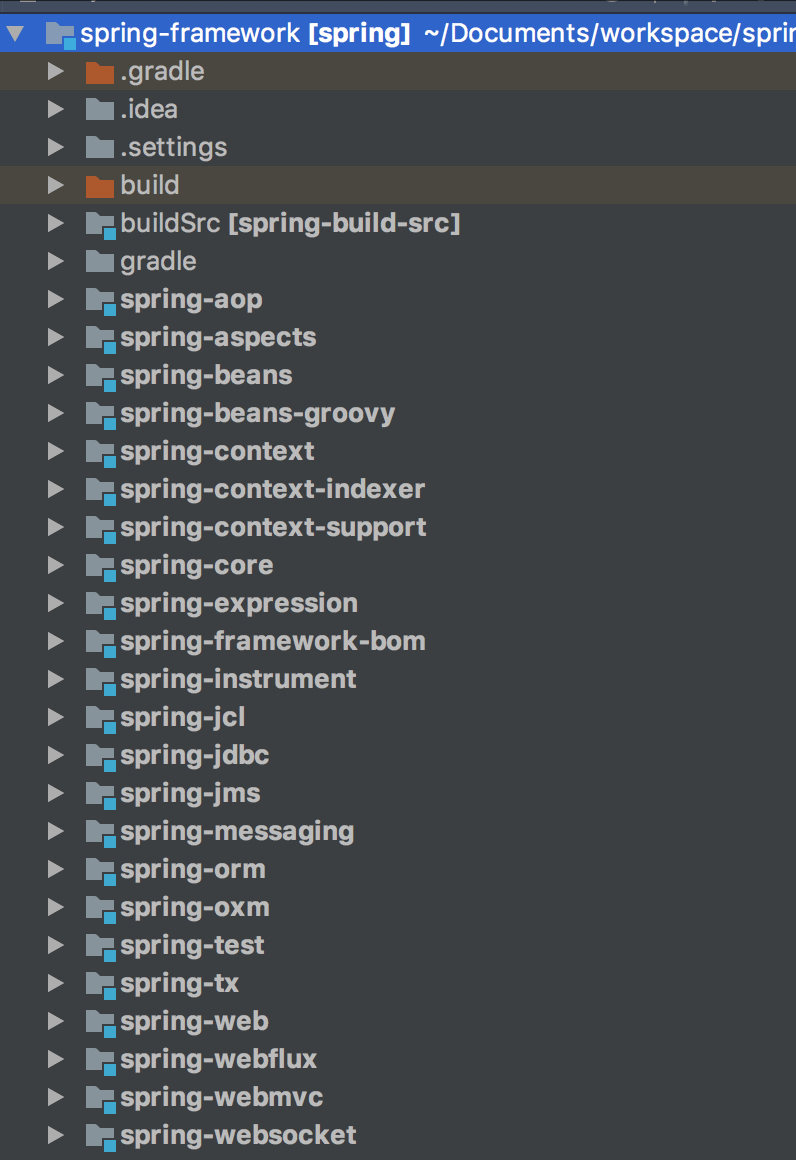Java程序员,就是要学会一个名字叫做“春”的东西,这玩意运用的非常的广泛,现在如果你的业务系统或者软件没有在这个东西上开发,都不要意思拿出来。因为你更不上时代了。在平时的工作的中基本都是简单的运用,没有深入的了解内部的肌理。这次我一定可以满满的看完里面的骨架。加油!加油!加油!
在之前我也看过一些讲Spring的书籍,比如<<Spring揭秘>>,《Spring技术内幕》。大体知道了Spring的工作流程,但是还是有些迷茫。有一点一知半解的感觉。接下来我准备以自己一知半解的半桶水的知识去阅读Spring的源码。根据自己的模模糊糊的感觉和去网上搜索来帮助阅读。这一次要地毯式的搜索阅读。可是有时也会觉得Spring 框架这么大,如此的阅读是不是浪费时间。但是又有另一种想法,只要我们把每个类的作用都了解清楚了,每个类都自己写一下单元测试。都跟进源码阅读。这样等我大部分的内容都阅读了,Spring的了解深度会更加清晰咯。
首先第一步就是下载Spring源码,然后导入Idea中,如下图所示。

Spring 最最最核心的地方就是Bean,所以我准备从spring-beans这个工程看起。首先第一个package: org.springframework.beans.annotation,这个包下就只有一个类AnnotationBeanUtils,该类就只有一个核心的方法,就是拷贝注解值到指定的类中。
public abstract class AnnotationBeanUtils { /** * Copy the properties of the supplied {@link Annotation} to the supplied target bean. * Any properties defined in {@code excludedProperties} will not be copied. * @param ann the annotation to copy from * @param bean the bean instance to copy to * @param excludedProperties the names of excluded properties, if any * @see org.springframework.beans.BeanWrapper */ public static void copyPropertiesToBean(Annotation ann, Object bean, String... excludedProperties) { copyPropertiesToBean(ann, bean, null, excludedProperties); } /** * Copy the properties of the supplied {@link Annotation} to the supplied target bean. * Any properties defined in {@code excludedProperties} will not be copied. * <p>A specified value resolver may resolve placeholders in property values, for example. * @param ann the annotation to copy from * @param bean the bean instance to copy to * @param valueResolver a resolve to post-process String property values (may be {@code null}) * @param excludedProperties the names of excluded properties, if any * @see org.springframework.beans.BeanWrapper */ public static void copyPropertiesToBean(Annotation ann, Object bean, @Nullable StringValueResolver valueResolver, String... excludedProperties) { Set<String> excluded = new HashSet<>(Arrays.asList(excludedProperties)); Method[] annotationProperties = ann.annotationType().getDeclaredMethods(); //获取注解上的方法 BeanWrapper bw = PropertyAccessorFactory.forBeanPropertyAccess(bean); //同过bean对象获取bean的定义BeanDefinition for (Method annotationProperty : annotationProperties) { //遍历方法 String propertyName = annotationProperty.getName(); //获取方法名 if (!excluded.contains(propertyName) && bw.isWritableProperty(propertyName)) { Object value = ReflectionUtils.invokeMethod(annotationProperty, ann); //获取注解方法上的值 if (valueResolver != null && value instanceof String) { value = valueResolver.resolveStringValue((String) value); //处理value的值,StringValueResolver的作用比如处理占位符${} } bw.setPropertyValue(propertyName, value);//把该值设置到bean定义上。 } } } }
从上面的解释,应该非常清楚该工具类的作用,现在我们来写一个例子来验证。
package com.qee.beans.annotation; import java.lang.annotation.*; @Retention(RetentionPolicy.RUNTIME) @Documented public @interface FooAnnotation { String name(); int age(); }
package com.qee.beans.annotation; import java.lang.annotation.Documented; import java.lang.annotation.Retention; import java.lang.annotation.RetentionPolicy; @Retention(RetentionPolicy.RUNTIME) @Documented public @interface Foo2Annotation { String accountId(); }
package com.qee.beans.annotation; @FooAnnotation(name = "xiao ming", age = 23) public class Foo { private String names; private int age; @Foo2Annotation(accountId = "123456") private String id; public String getNames() { return names; } public void setName(String names) { this.names = names; } public int getAge() { return age; } public void setAge(int age) { this.age = age; } public String getId() { return id; } public void setId(String id) { this.id = id; } public void setAccountId(String id){ setId(id); } }
package com.qee.beans.annotation; import org.springframework.beans.annotation.AnnotationBeanUtils; public class AnnotationBeanUtilsTest { public static void main(String[] args) throws NoSuchFieldException { testCopyProperties(); testCopyProperties2(); testCopyPropertiesWithIgnore(); } public static void testCopyProperties2() throws NoSuchFieldException { Foo2Annotation annotation = Foo.class.getDeclaredField("id").getAnnotation(Foo2Annotation.class); Foo foo = new Foo(); AnnotationBeanUtils.copyPropertiesToBean(annotation, foo); System.out.println(foo.getId()); } public static void testCopyProperties() { FooAnnotation annotation = Foo.class.getAnnotation(FooAnnotation.class); Foo foo = new Foo(); AnnotationBeanUtils.copyPropertiesToBean(annotation, foo); System.out.println("Name : " + annotation.name() + " " + foo.getNames()); System.out.println("Age : " + annotation.age() + " " + foo.getAge()); } public static void testCopyPropertiesWithIgnore() { FooAnnotation annotation = Foo.class.getAnnotation(FooAnnotation.class); Foo foo = new Foo(); foo.setName("Juergen Hoeller"); foo.setAge(30); AnnotationBeanUtils.copyPropertiesToBean(annotation, foo, "name", "age"); System.out.println("Name : " + annotation.name() + " " + foo.getNames()); System.out.println("Age : " + annotation.age() + " " + foo.getAge()); } }
从上面测试例子可以知道,AnnotationBeanUtils.copyPropertiesToBean把注解上的值拷贝给某个对象,只有某个对象有这个注解方法的setXX方法。并且如果该对象的某个属性已经有值了,就不会在拷贝注解上的值到该属性上。
从上面AnnotationBeanUtils的源码上,我们知道引入了新的Spring对象--StringValueResolver,BeanWrapper,ReflectionUtils。在之后的源码阅读中,在进行解析。在这里做一下红色标记,哇哈哈,哇哈哈,哇哈哈!!!!!!
待看的,等看看到这些包的时候,在继续分析下面的内容
org.springframework.util.StringValueResolver
org.springframework.beans.BeanWrapper
org.springframework.util.ReflectionUtils